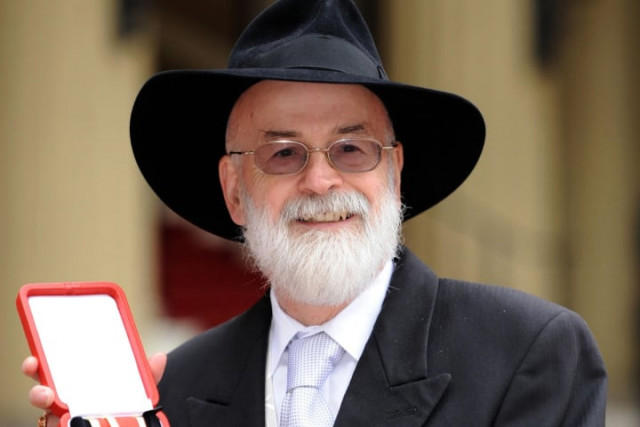British author Terry Pratchett dies aged 66
He won worldwide fame with his Discworld novels about a flat, parallel universe balanced on back of four elephants

Pratchett, who sold over 85 million books worldwide, "passed away in his home with his cat sleeping on his bed, surrounded by his family", said Larry Finlay, managing director at Transworld Publishers.
"The world has lost one of its brightest, sharpest minds," Finlay said, adding: "Terry enriched the planet like few before him... his legacy will endure for decades to come."
After being diagnosed in 2007 with a rare form of early-onset Alzheimer's, which he called an "embuggerance", Pratchett campaigned to raise awareness and reduce the stigma related to the disease.
Read: Mockingbird' author Harper Lee to publish sequel in July
Pratchett won worldwide fame and a cult following with his Discworld novels about a flat, parallel universe balanced on the back of four elephants which themselves stand on the shell of a giant turtle.
He wrote the first book in the series, "The Colour of Magic", in the late 1960s although it was not published until 1983. The 41st book was completed last summer, before he succumbed to the final stages of his disease.
A fan of science fiction and conventions from his youth, Pratchett wrote his first Discworld novel to make fun of the rival fantasy genre - but the target of his satire grew to include all the world around him.
"As all who read him know, Discworld was his vehicle to satirise this world: he did so brilliantly, with great skill, enormous humour and constant invention," Finlay said.
After her father's death, Pratchett's daughter Rhianna referred to one of the recurring characters in the Discworld novels, Death, a strangely endearing creature who is fond of cats - and whose utterances on the page are written in Caps.
AT LAST, SIR TERRY, WE MUST WALK TOGETHER.
— Rhianna Pratchett 🧙🏻♀️ (@rhipratchett) March 12, 2015
Terry took Death’s arm and followed him through the doors and on to the black desert under the endless night.
— Rhianna Pratchett 🧙🏻♀️ (@rhipratchett) March 12, 2015
Pratchett wrote more than 70 books over the course of his career, and Finlay said that in the last few difficult years, "it was his writing that sustained him".
He found it difficult to type and so switched to dictating to his computer, refusing to let his disease silence him.
As well as campaigning for Alzheimer's, Pratchett was a patron of campaign group Dignity in Dying and a vocal opponent of the British prohibition on assisted suicide.
Prime Minister David Cameron was among those who paid tribute to the author, saying in a message on Twitter: "Sad to hear of Sir Terry Pratchett's death.
Sad to hear of Sir Terry Pratchett's death, his books fired the imagination of millions and he fearlessly campaigned for dementia awareness.
— David Cameron (@David_Cameron) March 12, 2015
"His books fired imagination of millions and he fearlessly campaigned for dementia awareness."
Those affected by his campaigning work also spoke of their admiration of Pratchett, who was knighted in 2009.
Jeremy Hughes, chief executive of charity the Alzheimer's Society, said he had "fundamentally changed the way dementia is seen and understood".
Terry Pratchett changed the way dementia seen & understood. A passionate campaigner for change he helped drag dementia out of the shadows
— Jez Hughes CBE (@JezHughesCBE) March 12, 2015
"I was struck by his passion, resilience and courage to fight and kill the demon of dementia... Never dwelling on his own dementia, he used his voice to shout out for others when they could not."
Sarah Wootton, chief executive of Dignity in Dying, added: "His brave approach to confronting issues of death, including his own, was a heartfelt demonstration of dignity."
Pratchett is survived by his daughter and his wife, Lyn.



















COMMENTS
Comments are moderated and generally will be posted if they are on-topic and not abusive.
For more information, please see our Comments FAQ